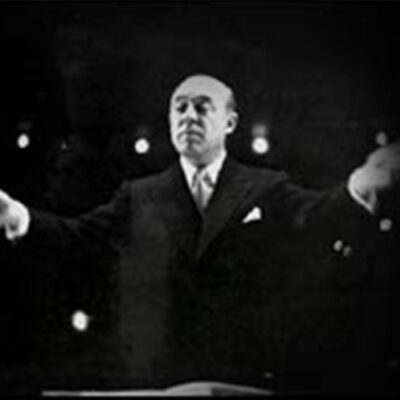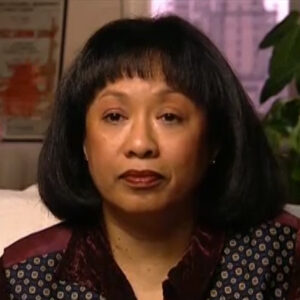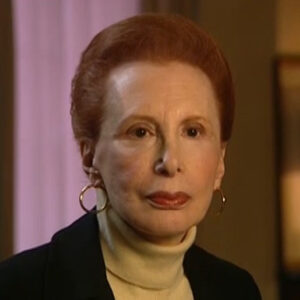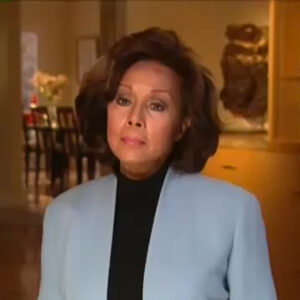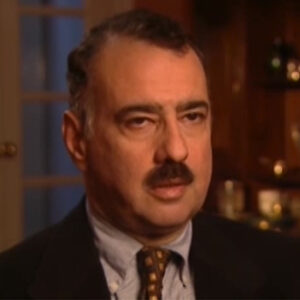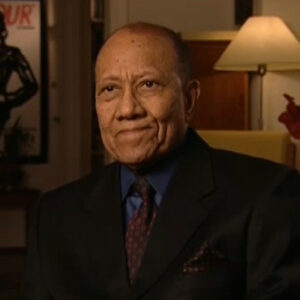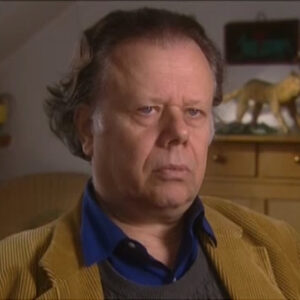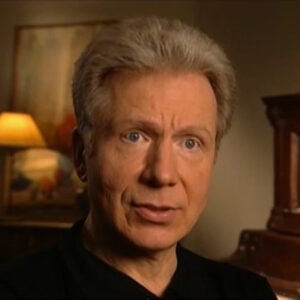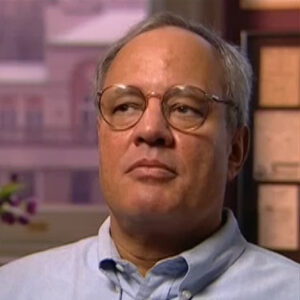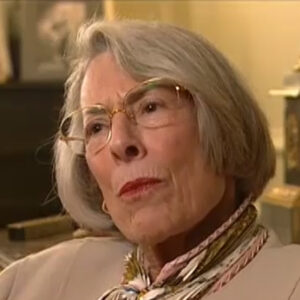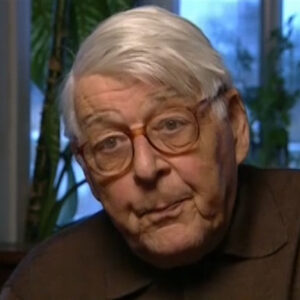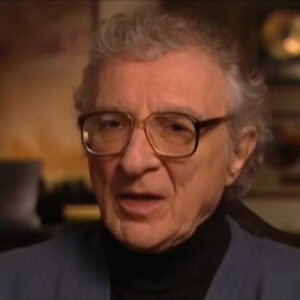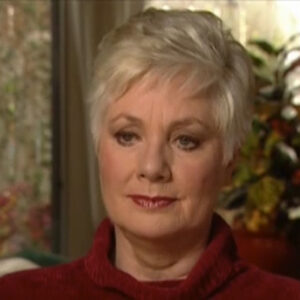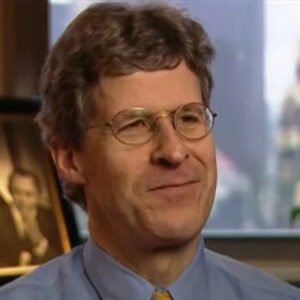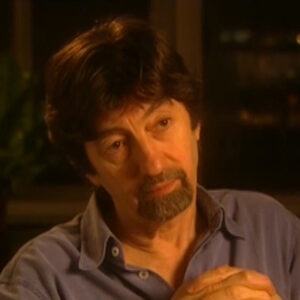Speaker 1 I my earliest memory was around four and a half or five and gravitating towards that instrument, I remember where it was in the living room and getting myself over to it, not being able to play really and pretending at lunchtime that I was my father and I was writing music. I remember that and being quite upset and irritable when somebody came in such time for lunch. I don’t remember begging for lessons, but the story goes that I kept after everybody until finally they said yes, but it was once I started to have lessons, I adored it. I just adore it.
Speaker 2 Tell me whether the father was ever that person to come to you at the piano when you were very little. And what if there was any interaction that
Speaker 1 the the only interaction that I remember when with my father and the piano again goes back to very early five, five and a half when in pretending to write, I wrote a little piece and played it for him when he came home and then realized that there was some excitement about that. And he wrote it out in manuscript form. And I wrote on the back of it, which was a real mess. But I knew there was there was something kind of exciting about that. Later, as I was older, I knew he loved hearing me practice, loved hearing me play, but he didn’t ever come near practice time or correcting me about anything.
Speaker 2 I know that he like to work alone and never get to be quiet. We’ll talk about that later. Let’s not get to that at this point. But I’m still the as the little girl. Did he let you sit in his lap while he played, was there ever any, you know, sitting next to under you will lie under the piano? What was you know, I guess it would be in in less serious moments for him.
Speaker 1 They were serious moments for him because he, as far as I can remember, with one exception, only played the piano when he was working. He didn’t sort of go over and play it. So when he was writing, there were very strict rules, like no whistling or singing or noise. And the house that we lived in in the country early, early on in the war didn’t have any doors to the living room. And the main staircase came down into the living room. There was a landing and there were three steps. And I know about the whistling that was out, but nobody said that I couldn’t jump from the landing down to the floor and he never said anything. He would just give me what was referred to as a hairy eyeball. But there was no there was no being in the room with him. And if if you were dumb enough to want to listen while he was writing, you know, you better do that behind a closed door. So you were out of sight.
Speaker 2 When you forgot and you whistled while you play with your friends or you
Speaker 1 I didn’t, I didn’t. You can’t. You can’t forget. Something like that, I don’t think I ever did, that was it was very strict, and then as I got older, I knew damn well that this was something that was important and serious. And there was no way that you could write music while some kid was singing or making noise in the background.
Speaker 2 But how did you know that? You know, because from the next room in the piano, get out of here, or your mother would come and grab you. Or, you
Speaker 1 know, we when we knew the routine was that when he had it
Speaker 2 as I was talking.
Speaker 1 Right. Right.
Speaker 2 So we knew the routine.
Speaker 1 There was a definite routine when he was writing a show or when he was going to write, he would get going in the morning and we knew that was his time. And we steered clear of the living room from the house in the country or in the New York apartment. Years later, there were doors that closed off the living room completely. So he had total privacy and we had the freedom to listen as much as we wanted.
Speaker 2 When did you first realize that your father was a professional, that he was writing something? This is what he did at his piano playing wasn’t just. Fun, somebody playing,
Speaker 1 I don’t really know when Oklahoma was being written, there was a sense of excitement. And there there was some interaction, it was the beginning of a kind of tradition when he finished writing a song, he would when he was ready, he would play it for us from my mother and my sister and me. He couldn’t sing. He had a terrible voice, but he could whistle so he would whistle the melody and play everything else. And he was always very modest about his playing. I loved the way he played. I thought he played wonderfully and with Oh, what a beautiful morning. I remember his teaching me how to how to play it. And we went through it once and it was the the verse. There’s a bright golden haze on the meadow and. Those were the days when I was pretending that I knew how to sight read, but I didn’t, if somebody played the piece of the piano teacher played the the piece for me, I would say, oh, fine, I think I’d like to learn that. And then because my ear was good enough, I could play it and pretend that I was reading at the same time. So I was having a struggle trying to read his tiny little notations on the manuscript paper. And I came in a couple of beats late on, oh, what a beautiful morning. And I got a dirty look from him and we did it again. And the second time he went and it was a tiny little sound, but it was like a bold and I never forgot that years later I realized, oh, shoot me. I was seven or eight. And it was it was pretty young. But that was the my memory of always playing the songs with him and waiting for that to happen. I loved it. It was such fun.
Speaker 2 Tell us about his reaction after he play you. A song to gauge your reaction. Did you care what you thought? Was he looking for the. Did you all clap and jump up and down?
Speaker 1 Yeah, I think I think we jumped up and down after after he played something, there was a moment of quiet and then there was a lot of excitement. I don’t think there was ever any question that he loved hearing that that we loved it, nor was there a question about whether or not we loved it when many, many decades later, when his music had changed as he got older. There were times when it was sometimes difficult because I didn’t have for me anyway, I didn’t have the same enthusiasm for everything that I heard. But as a young child, there wasn’t anything that I just didn’t think was magical and it was hard to sit still for it.
Speaker 2 When did you realize that your father was Richard Rodgers?
Speaker 1 I think I realized he was Richard Rodgers right after Oklahoma opened. And there was obviously something very good that had happened. And my mother, as a treat, took us to the zoo for lunch. And it was I think it was a weekday, wasn’t it? Was the school day. And we had frankfurters. And that signal something something special had really gone down. Then I also remember his my father taking me to see the matinee of Oklahoma after it opened because we weren’t allowed to go to opening nights until we were I think the age was 12. We were finally allowed. And there was another kind of tradition that he would take me to the first Saturday matinee and standing in the wings and looking out and seeing a child in the audience. I was so excited and realized that this is really pretty special. This is pretty great. That was another clue that something good was going on.
Speaker 2 Do you have any recollections of things you might have said to you or when he was with you at the theater, either in Oklahoma or any other play? Did he stand next to you? Did you hold his hand, talk about being what was it like to be with your father at the theater, one of his boys?
Speaker 1 Um, my my recall is that when I was sitting and seeing the show, he wasn’t he was in the back seeing it from the back of the house or around backstage. If we saw it and I wasn’t sitting down, it was it was together from the back of the theater. And there was there’s no talking during a show. You don’t do that. So I don’t remember conversations that we had
Speaker 2 after walking out, get a cab home. Ever comment or
Speaker 1 probably. But I don’t remember anything monumental. I remember one show revival of Pal Joey, and I was allowed to go see it because I was too young to understand what was going on. My sister, four years older, was not allowed to go because she would have understood it. So that was a little confusing for everybody. But I knew the score. I knew all of the songs. I knew Bewitched. And when Vivienne Siegel went up on her lines and we were my father and I were standing together at the back of the house and I could feel my my heart racing and dreams of glory. I was dying to run down the aisle and run up to the stage and give her the lines that she couldn’t remember. And I took one look at my father and thought, oh, yeah, sure didn’t move. Just stood there.
Speaker 2 He had no reaction.
Speaker 1 Yeah, he I think he muttered something to me. This is the second time she’s done that. And apparently on the first the first matinee after the show opened, the last time she’d done it, she did the same thing. She got confused and forgot her lines.
Speaker 2 Stop a second. Look, could you tell us about his childhood in Mount Morris Park? I mean, give us that name and tell us where it was in New York City and and that he lived with his parents and grandparents. And was it a happy childhood, a difficult childhood?
Speaker 1 I can’t tell you a whole hell of a lot about Mount Morris Park, because as far as I know, I was only there once. And that was long after he grew up uptown. That much I knew he was he lived way uptown. I didn’t get good feelings about family life. They were funny stories about his father, who was a doctor, and things that happened from time to time that were either amusing or terrifying to him. But I heard more comments about the difficult relationships and the silences that went on at meals and a grandfather who would often storm out and wouldn’t be at meals at all. So I didn’t I didn’t get an impression of a happy a happy family or there were there were pieces of time that were just simply missing. I never really. Heard much about what he and morti his older brother did together, if if they did things, I caught up with some of that in musical stages, the autobiography that my father wrote. But I don’t. There were not wonderful tales of merriment.
Speaker 2 What was his solace then?
Speaker 1 Can you tell us that as a child? I have no idea. Absolutely no idea. And nor was it the kind of thing that he ever discussed with me. I don’t have any recollection of that.
Speaker 2 In his autobiography, he says that the piano was what he went to to get away from the cat. Mm hmm. Mm hmm. Um, how was that?
Speaker 1 But but that must have been older. I was thinking of of his being a kid eight, 12, 10. And I would guess in his teens, he probably gravitated towards the piano a lot.
Speaker 2 We know that when, um, he wrote the songs for Poor Little Rich Girl in 1920, he was 18 and he went away for the summer to camp and came back and half the score was replaced. Um, are there any stories about that? Did you talk about that
Speaker 1 earlier in life? Not that I can recall. I read about it in a book, but,
Speaker 2 uh, um, how about stories about the courtship of your mother?
Speaker 1 It’s such a funny question because we heard them over and over again, we heard about the ships crossing and hello and goodbye and funny comments that they made to each other. I tuned out after a while. I stopped listening because I’d heard it before. So today I’m left with a feeling of of blank. At the moment, I can’t I can’t tell you anything that’s new.
Speaker 2 It’s it’s all our audience doesn’t know any of it. So maybe you can tell us just sort of in a couple of sentences what how they met or, you know.
Speaker 1 No, I think you’re going to have to ask me out for that one.
Speaker 2 Absolutely. Fine. Um. Your father traveled a lot. He was away at times, your mom didn’t get to go time alone in Hollywood. Was that easy on your family? Difficult. What was who was number one and
Speaker 1 number one in the family was my father and my mother was a close second. So if if she was unhappy with his being away, we were unhappy. It was not an unusual kind of thing. But when I was before I was born and they spent some time out in California, and then there were blocks of time when she was pregnant with my sister and she was in New York and unable to go to California. And a number of trips, I think when he was in London with shows, I think it was very tough for both of them and probably tougher for her because she was home with not a whole hell of a lot to do. He at least was busy and doing what he loved doing best of all.
Speaker 2 Let’s talk about Uncle Larry. What are your memories of Uncle Larry?
Speaker 1 Very much. My first memory is very short, very, very short little person, which was great for somebody as five or six years old.
Speaker 2 I need you to say that with with Uncle Larry.
Speaker 1 I never called him Uncle Larry
Speaker 2 or whatever you called my
Speaker 1 first number. I don’t recall. Yeah, I don’t remember what I called him, as a matter of fact. So we know
Speaker 2 what you’re talking about.
Speaker 1 My first my earliest recollection of Larry Hart was that he would arrive at our house in the country, tiny little person getting out of a car laden with presents packages for us. And the only other immediate memory I have is is a mannerism, a habit that he had of rubbing his hands together and making a horrid kind of hawking noise in his throat, which I once imitated years later and got hell for doing. I don’t remember a great deal because I was so young and he died. You would know better than I what what the year was.
Speaker 2 Forty four, 43,
Speaker 1 43, I should remember. I was nine. I should have had, it seems to me now, much more of a memory of his death than I do. But I think from the age of five on for several years, a lot of people seem to go out on the street and sort of drop dead. And there was a decision made. Don’t tell her if somebody I knew Larry had died. But it’s in retrospect that that I have.
Speaker 2 So any friction in their relationship, we’re having trouble getting him to work or having to corral him.
Speaker 1 I, I wasn’t aware of any friction. The only thing I vaguely remember was that my mother would have a fit because the smell of cigar smoke hung heavy in the air. And you always knew when Larry had been there because you could you’d get off the elevator and get the cigar smoke.
Speaker 2 Could could, um. Your father was a consummate professional and quite disciplined in his work. Um. Can you talk about that maybe even later in life about your observations of him? Did he always want to have things exactly right? What was his? Work ethic, what was what was he, a perfectionist, not a perfectionist? What was that like,
Speaker 1 as you ask about his his perfectionism and his work ethic? The first thing that I think of was that it didn’t seem to me that that he was he was rigid. And yet my memory is that on the piano, there were X number of sharpened pencils with green erasers at the ready. There was a ruler. There was a card table, which was where he turned and did his manuscripts. There were manuscripts up on the keyboard on the. What the fuck is that called? You’ll have to cut
Speaker 2 participating in it.
Speaker 1 There were it’s not the music stand either. What is it? That thing? What is
Speaker 2 this or is it
Speaker 1 now? The baseboards runs around the living
Speaker 2 room music folder
Speaker 1 where you put the music when you’re when you’re writing, when each of him will do. All right. OK. And now I can’t think of what the thought was,
Speaker 2 it was all the neatness,
Speaker 1 yeah, everything, everything, everything was neat, the the stool that he wrote from the the table to the right, because that was the only only way being right handed that it made the most sense for him. Doors closed, foam’s off. Nobody called him. You wouldn’t dream of interrupting him while he was working. I can’t think of anything else that was perfectionist except whatever perfection he demanded of himself in in his work. And when he was making a manuscript that sometimes drove me nuts, I would hear the same phrase being repeated over and over and over as he was making notations and getting the exact harmonies that he wanted. So much of what he wrote sounded as though it just fell out of his fingers and fell out of his head. And it did, except that nobody could really copy it. It wasn’t wasn’t as simple as as it sounded. It was with great skill and good education. Good background.
Speaker 2 Was he I’ve got I want to follow up on that and then I’ll go back to a follow up of the pencils and all. Um, was he ever frustrated or talked about how people always say, I, I write it so fast, but, you know, did he ever talk about that?
Speaker 1 He did talk about the the. The PR that that he wrote rapidly and that he had to think about it a great deal, and he I never really bought it because I don’t care how often or how long you think about something in advance, there has to be something else. Very special, talent, genius, whatever you want to call it. It doesn’t just come falling out unless it’s in there to begin with. So he didn’t he didn’t talk much. He didn’t focus on the stories about him. He was very polite when he get the same story. I don’t I don’t recall that he he discussed it a great deal.
Speaker 2 So there was never any. How can I think I always write so quickly or don’t they know how hard I work or any of that?
Speaker 1 No. And I don’t think he ever talked about the actual notation that the making of the musical scores, which were very full and very professional. So whoever was doing the orchestration knew exactly what he wanted that chord to be. And whatever the progression was, there was no mystery.
Speaker 2 Let’s get back to the neatness and tell me whether the scores themselves were as neat as the pencils in the areas around or where they all crossed out or. I’m trying to
Speaker 1 know it was, but I think it was I think it was pretty neat and had to be you because it would be too easy for an orchestrated to make an error if the notes weren’t very clear. So I think probably not out of a feeling of it has to be neat. It wasn’t obsessive as much as it was sensible
Speaker 2 when he became a producer. Did. Do you think he had trouble dividing his time between composing, producing, being a business man, and did life change for him?
Speaker 1 You’d have to ask him. Well, that doesn’t help you with your question. I don’t know if life changed for him when he began producing and separating out the different things. I wasn’t part of that part of his life. I was in school. He was doing all of his stuff. But I’m assuming that a lot of it took place in the office, the the business and the producing the phone calls or whatever. And writing was something that was very separate. I don’t know how much he wrote actually in his office. There was always a piano there and we knew that sometimes he wrote in the office because he wasn’t writing at home. But I think the writing was probably more separate from the day to day office life.
Speaker 2 Go, Oscar, you’re a little older now. What was their relationship and what was your relationship to us? Let me hear his name.
Speaker 1 Which which relationship with Oscar do you want first,
Speaker 2 whichever you want,
Speaker 1 because I really I can only guess, and it’s an educated guess about my father’s relationship with Oscar based on some of the things that I recall very cordial. I never thought they were terrifically good friends. I thought it was more a working relationship than anything else, although there was some socializing. But I never had the feeling that the four of them, the two Dorothea’s and my father Anarky, as he was called, got together a great deal because they really loved being together. I don’t I don’t really remember anything except a rather smooth, even writing relationship. There were times when Oscar was slow in delivering a lyric, and so my father would wait and I got into a lot of trouble once. And I’m not I can’t remember which which show it was. But he was waiting for one lyric. It takes all kinds of people to make up. The World was the beginning of the lyric, and it finally came and it was lying on the piano. And I was not a kid. I was I was early married at that point. And I thought, hmm, why don’t I have a go at it and just sort of compose something in the style of. And I did. And my husband and I had dinner at a distant relatives, Dick Lewine, who was very musical and played by ear and also played wonderfully, very much like my father. And as a kind of a joke, I sat down and played him the latest song, which he he said that’s that’s fascinating. I’m pretty sure that we then told him that this was not my father’s music. This was mine. And he doubled back. And it was months later that my mother came into my room one day and said, we heard that. And I caught bloody hell from her. Never, never a word from him. He never said anything
Speaker 2 because you showed somebody else the lyric because
Speaker 1 no know, because I had written my music as though it was his music to to the lyric. Which is the kind of thing, oops, that is somebody coming in the gate, the gate. Yeah.
Speaker 2 Who might this start to be an obstacle? Can we talk about what happened to him sort of in a sentence or two? What was the first thing that beset him?
Speaker 1 Well, the first major illness that he had, I remember so clearly because it was shortly after my husband and I had been married and had just moved out to Oklahoma, to Lawton, Oklahoma, where he was stationed at Fort Sill. And I remember the weekend that my that my parents called and my mother saying, your father has a little thing and he’s got to go into the hospital and he’ll be going in over the weekend and operated on whatever. And I said, well, shall I should I come home? And she said, oh, no, I don’t think so. And then she mentioned Memorial Hospital. I got off the phone and about half an hour later, everything began to click and I said to my husband, Memorial is cancer and I’m calling them back. Well, I went home and it was a horrendous operation. And I remember being so, so scared. And so I’m sure was was he was very unpleasant in the after effects went on for years with difficult dentistry and all kinds of cancer of the jaw is a is tough. And he was sensitive about being photographed with the right side of his face showing. And he was very, very good about it. Maybe too good.
Speaker 2 That’s the therapist in New
Speaker 1 York, right, right now that you’ve all. Well, also, it was 1955 when he had that surgery. And we’ve learned so much in the decades since then about how to work with patients before and after surgery. And it’s a different ballgame.
Speaker 2 Now, what what’s the next thing that happened and how many years later would that have been?
Speaker 1 It was a number of years later. Are we talking surgery now,
Speaker 2 surgery or had a stroke or heart attack
Speaker 1 much, much later the summer that the first astronaut landed on the moon. He landed Atlantic City Hospital. And my mother and sister were away in Russia and he’d come up to my house for the weekend before he got sick and the following weekend didn’t feel well, went to the hospital, had the the coronary. And that that was another interesting period of time with my mother away and getting her back. And I remember the night, the first night that he was there being in the room with him while they were inserting a pacemaker. And the the television camera was up at an angle of the astronaut landing on the moon as the other little TV camera showed the the wire going being inserted. And I thought, hmm, I suppose this is kind of an interesting something to have to remember. I never forgot it. It was it was quite a night.
Speaker 2 Let’s stop for a minute. And about the one more major
Speaker 1 when he had a laryngectomy.
Speaker 2 Wait, wait, wait. We had a squeak. Go ahead.
Speaker 1 He had a laryngectomy. Let’s get the historian in. I don’t keep track of these dates are seventy five.
Speaker 2 Seventy five or so. It was right before you went to Rex. Mm. Not sure because he wasn’t saying so. Well it seems.
Speaker 1 Yeah. Yeah. It was mid 70s that he had the laryngectomy and as lousy as the cancer of the jaw was, I think the laryngectomy was much worse and much harder to recover from and to live with for the rest of his life. And he chose to try to master something called esophageal speech, which is sort of breathing in and burping out the sounds, which he he wasn’t able to do terribly well. He didn’t want to have the mechanical voice. He he hated that sound. And I I think what happened to him was it was so difficult for him to communicate that he could he could do it when he was just with a small group of people. But he had enjoyed being with a lot of people and there was no way that he could be heard. And I think as he got older, the effort to talk became greater and greater. So it was it was lousy. It was really tough.
Speaker 2 Tell me whether or not he was a big complainer, hypochondriac, how this all affected.
Speaker 1 He he was not a complainer. And I think he was a big hypochondriac. He was worried about all kinds of things, but he didn’t talk about it. We knew that that he was worried about his heart. He smoked three packs of cigarettes a day. He would get up and swing his feet over the bed as the story went and before he’d even gone into the bathroom, the first cigarette would be lit. And he was terrified that he was having some kind of heart trouble and stopped smoking instantly and never went back to it. That was the end, the end of the smoking. He was always scared of cancer, and that seems to have been directly related to his background, to his father having been a doctor, to his mother, having had a mastectomy, which was really pretty early in those days. So it was almost a cancer phobia and he kept getting cancer.
Speaker 2 Um, talk about whether the illness has affected his work over time, how?
Speaker 1 I think I think they did give me this. I think his his illnesses definitely affected his work, his health in general. And we’re going to have to stop for a minute because I don’t know what to do about what is always on my mind. And I don’t know whether I want it to to to grow.
Speaker 2 So, again, use the word illness and then talk about how it affected him and how he might have reacted.
Speaker 1 Well, I think going back to a period in the 50s when he had had his cancer of the jaw surgery and I’m sorry, I’m hearing noises up there and wondering whether that’s bothering you. Shall I tell whoever is trotting around up there to get ready?
Speaker 2 So start again from the 50s
Speaker 1 after the cancer, the surgery, the next major upheaval in his life occurred a few years later and. It was a secret, pretty well kept while he was alive, but there’s nothing very secret about it anymore. He had a drinking problem and in those days, in the late 50s, medicine didn’t know as much as we now know. And he sort of slowed down to the point where between whatever alcohol he was drinking and tranquilizers that he was put on to help him get off the island, nobody realized at that point that the brain can’t distinguish between alcohol or Valium. It’s the same thing muddles you. And he was not a falling down drunk. You didn’t know that he’d been drinking a lot, except that those of us who who knew him at all well saw him retreat more. He got sleepy. He didn’t participate in conversations. And he really almost ground to a halt that particular summer. And he went into pain. Whitney. Part of New York hospital, and I think he was there for about six months getting whatever help he he hoped to get, and I think after that the alcohol was was an ongoing problem for him. He had periods when he stopped drinking, periods when he went back to it. And I think it certainly interfered with his work as he got older. You just you can’t write you can’t think very clearly when when you’re muddled and between the physical illnesses that he had and the the drinking problems. I would have been fascinated to to replay his life without the alcohol, without the drugs, because I wonder what what he might have done after The Sound of Music, which for me was kind of the cut off the the shows after that did not have the same kind of electric. Feeling.
Speaker 2 Mary mentioned to me when we first met, um, there were bouts of depression, can you talk about that?
Speaker 1 I would guess that that he probably was always depressed, and that’s that’s a matter of public record. There was a book that came that was published called Letters to Dorothy that my father wrote my mother in the early, early years when he was in his late 20s. He was in California, she was in New York. And there were so many references in the letters to how depressed he was. And he didn’t he didn’t know what was the matter and he couldn’t figure it out. Depression and drinking again, you know. No, nobody then ever said, hey, drinking sometimes makes you depressed. And it’s a vicious circle. But I think he he was he was more depressed than he was a lively, happy person for somebody who gave such incredible pleasure to so many millions of people not to have had the same kind of joy and contentment and comfort. And his own life was just awful.
Speaker 2 Let’s go back in time. He was social, they went out a lot to talk about that socialize with, tell us if he was social or not.
Speaker 1 He was very social. He loved going out. He loved parties. He loved having people over. Why not? He had a wife who was wonderfully gracious and a marvelous entertainer and beautiful apartment and terrific food. So all he had to do was say, yeah, sure, fine, let’s let’s have him for dinner or whatever the friends were. Very mixed. There were a lot of theatrical people, there were a lot of writers, I think as a child growing up with this, it was something that I took for granted when I was little. I took it less for granted as I got older and I was sitting next to John Hersey and talking to him about the color of the dining room walls. And I made some joke. He said something about not knowing what color they were. And I said, oh, yeah, they’re bright orange. And he said, Are they really? And I said, no. Are you color? Yes. There were funny things that made me think, who am I talking to? I’ve got to straighten up here. But there were Edna Ferber was another wonderful old friend, one of Mary’s and my favorite marvelous woman. There were so many people who wouldn’t know where to start.
Speaker 2 Talk about your father interpersonally, either with you, with colleagues, with friends. Was he warm, caring, loving arm around? Was he cool? Was he detached? Was he I mean, I don’t know him, so, you know, help me figure out who he is.
Speaker 1 He was a mixture of everything. He could be extraordinarily warm and outgoing. And you’d get the feeling that he knew exactly what you were thinking. You had a marvelous habit of reaching out, holding out a hand, usually at the dinner table. And I usually Mary sat there. I sat here and my mother at one end and he was at the other end. And suddenly in the middle of dinner, he would put her hand out. And I like to think or I did think at that point that he knew I was feeling unhappy or whatever he could be. And wonderfully warm and as marvelous as all of those things were, he could also be the opposite completely. He could be totally withdrawn and very cold. There was nothing colder than his brown eyes when they fixed on you. When he was angry with you, he could be with friends. I think funny, which he also was at home to. His moods changed. I don’t think they changed as much when he was with people as when he was home. But my my overall impression of him was that he was reserved. I really never knew what he was thinking. He was pretty quiet and. You walked cautiously. He never he never that I can recall, said anything to make me feel terrible. It was rather that he didn’t say much of anything. It was it was not at all a close relationship, except for the musical, the musical parts, the playing of his songs with him and being able to talk a little bit about music and the extraordinary feelings that I had about living in a house, able to hear that kind of music,
Speaker 2 talk for a moment about when you’re older and you’re now playing the piano. I understand you’re a gifted pianist.
Speaker 1 Was was a gift.
Speaker 2 You were a gifted pianist, almost always had. And were there any conversations that he had with you about your piano playing?
Speaker 1 Not really. There must have been some. There was a discussion at one point when I was perhaps in my junior year in high school about my going to Aspen for the summer, there was an Aspen Music Festival and studying with Darius MeOh and I don’t remember what happened, but I didn’t go. It fell apart. It just didn’t didn’t occur. We we didn’t talk about my playing. If we had if I’d known that it was possible for me to have a pianist life, I would have jumped at the chance because playing was the one thing in my life that gave me extraordinary enjoyment and and peace and fully absorbed in everything that I was doing. I adored it. And it was it was difficult for me to to work out the traditional academic background and fit in the musical stuff. I don’t think I was good enough to have been a concert pianist, but I, I think I would have have probably done chamber music, which was interesting because he writes about having loved chamber music and going back and taking piano lessons so that he could improve his sight reading and and do chamber music was kind of interesting.
Speaker 2 So, of course, you became a pianist.
Speaker 1 So of course I did not. I did not. I went to a traditional school. I went to Smith College. I hated it and said, I want to come back and go to Barnard and be in New York. And I also hated the I’ve been to the Madness Music School most of my life and had one of the best teachers I’ve ever had in my entire life there. So when I got to Smith and there was a teacher who was not particularly good, it was agony to to work with this new person. And I’d already gotten the message that I was not going to be able to do a lot of music. I was going to go to Smith my sophomore year and maybe abroad to Paris my junior year. And then if I wanted to come back to New York City my senior year, I could. But none of this had to do really with with music. It wasn’t a consideration.
Speaker 2 Was there encouragement or discouragement from parents about music and say the word music?
Speaker 1 Well, in terms of piano, there was encouragement of Linda’s practising or Linda’s got a recital. And so they would both show up at recitals. But there was no real encouragement beyond that. I learned when I was much, much older. There seems to be a discrepancy about what age I was. I was taken to play for the head of then the Juilliard the Institute of Music, who apparently said to my parents, if you really wanted to to be able to be a musician, you’ll have to take her out of Brittany and really settle into a musical environment. And they didn’t tell me about the conversation. And I think if they had, I would have said, good, let’s let’s go. I I’ve thought about it many times over the years and I don’t think they could handle one more person in the household. He was trouble enough and life was was difficult enough without having to schlep a kid to to special piano stuff. So there wasn’t any encouragement there. And there was also. A, it was not subtle sometimes it was it was overt that whatever Mary did, I wasn’t supposed to do so the competition, but between the two of us got horribly complex and bollixed up. So in terms of writing, when people would say to me, don’t you want to write or why don’t you write? I really didn’t particularly want to. I thought I could. I could write. Why not? I grew up with it, but I thought what I did was watered down Roger’s stuff and I had much more pleasure from playing other people’s music than than writing my own
Speaker 2 talk about giving a recital for Richard Rodgers and tell us that you gave a what that feel.
Speaker 1 Giving a recital for
Speaker 2 him, you said we had replied, oh, well, they weren’t just your parents, this was Roger’s
Speaker 1 coming, right? Well, there were a couple of recitals that that I remember, particularly that
Speaker 2 second, we got to wait for a jet plane coming into Westchester. Really?
Speaker 1 I hear it.
Speaker 2 OK, well, go ahead.
Speaker 1 Can you hear my stomach rumbling? There were two recital’s that I go back to because I think both of them were sort of the beginning of stage fright for me. The first was when I was at the maddest music school. And David Mannus, who was one of the co-founders with his wife, was a tall, marvelous looking guy with great bushy eyebrows and blue eyes and a shock of white hair. And we did a violin and piano sonata together. And I was old enough to know that it was probably very cute. Who was this little kid in this tall, craggy man? And he made it a point of saying to me that I had to announce what we were going to play, which I did to my own horrendous embarrassment, because I said I was going to play Haydn Sonata in something, whatever the key was, by Haydn. And that was a horror for me, partly parents sitting in the audience, and I knew they would they would get that that glitch and you just didn’t make mistakes like that and get away with it or I didn’t think. That was OK. And years later, there was another recital for students at the Brearley School where I went and I played in that and played something called the Little White Donkey by Jackie Bear and got to the end of it. It was a very fast little piece and forgot the ending and realized as I was coming up on it that I couldn’t remember. So I made something up and I was so embarrassed about that scene. And my father said, what was that? What what were you playing? He knew he’d been hearing me practice it for a long time. He thought it was just terrific that I was able to make something up at the last minute. And that was the beginning of my hands getting clammy and my being terrified that I was going to make mistakes. And that got to be a real problem about performing. So I probably never would have been a pianist. It was it was more than I could handle,
Speaker 2 let’s call it for a second century. Can you tell us that and tell us what that must have felt like to him? Or if there was anything at home discussed?
Speaker 1 I wouldn’t dare try to tell you how he felt after Oscar died. It must have been. Awful. He certainly knew it was coming. We all we all knew it, but that says nothing about where you go after that. And he’s written about it in one book. He didn’t talk about it. He was so private. And if something was particularly painful, it wasn’t discussed. You might read it in an article or in passing or he might discuss it and probably did with my mother. But it was not dinner table conversation. It was too painful for him. And I think he had a really hard time being intimate with people on a kind of a superficial level. You just couldn’t couldn’t hack it. He was, I think, very gutsy, I can tell you what what I thought. Because he tried working with an awful lot of different people and there were some collaborators and I thought, why is he doing that? And the answer was that he was he was happiest when he was working. And he would try anything that almost anything that came down the pike if he thought it had a chance of of being something that he would enjoy doing.
Speaker 2 We’ll talk about gutsy. What about no strings? I mean, doing it all by himself. And could you tell us that
Speaker 1 No Strings was was the earliest show? I think. And I remember a great deal of excitement and vigor about that show. I remember excitement about going down to some place with Diahann Carroll to Bendel’s. And Donald Brooks was a dress designer who designed her costumes and his having a story about coming home and saying that that she was standing in front of a mirror in the dressing room and she had on some ballgown dress that he designed. And she said that she looked like an ice cream sundae and he was full of of humor and energy during that time. I think he enjoyed what went on during during the road. The the it was new. Hey, I can’t remember if it was New Haven, it was Detroit. It was a different, different city. But that seemed like the old days that that show.

